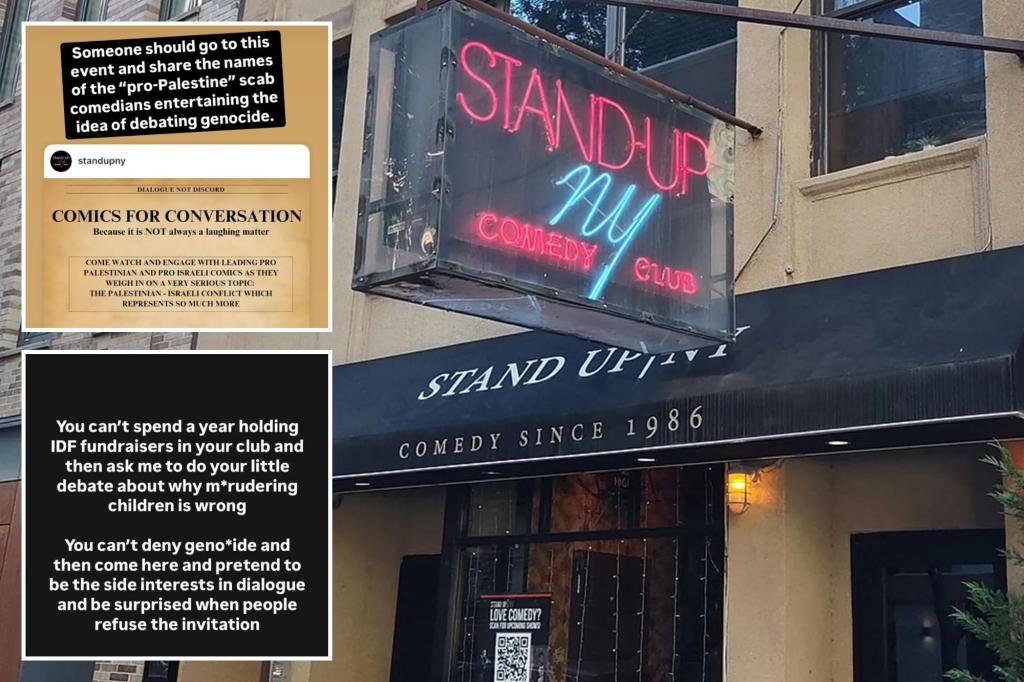The cancellation of a New York City comedy show intended to bridge the divide between pro-Israel and pro-Palestinian communities underscores the deep chasm separating the two sides, particularly in the wake of the recent conflict in Gaza. “Debate, Don’t Hate,” scheduled at Stand Up NY, aimed to leverage the unifying power of humor to facilitate a dialogue about the complex issues fueling the conflict. However, the initiative was met with fierce resistance from pro-Palestinian comedians and activists, ultimately leading to its cancellation. The show’s organizers envisioned a platform for open conversation and understanding, but the intense backlash reveals the significant hurdles to achieving such dialogue amidst deeply entrenched perspectives and heightened emotions surrounding the Israeli-Palestinian conflict.
The controversy ignited when pro-Palestinian comedian Eman El-Husseini publicly declined to participate, citing the ongoing violence in Gaza and accusing Israel of “genocide.” El-Husseini’s refusal, coupled with the withdrawal of at least 21 other comedians, effectively derailed the event. The organizers’ efforts to find replacement comedians proved futile, as the backlash intensified on social media. Critics accused the event of attempting to “both-sides” genocide, arguing that such a platform normalized Israeli actions and silenced Palestinian voices. This strong opposition reflects the deep pain and anger felt by many within the pro-Palestinian community, making any attempt at neutral dialogue appear insensitive and dismissive of their suffering.
The organizers, Robin Lemberg and Jon Bond, maintained that their intention was not to minimize the suffering of Palestinians or to equate both sides of the conflict. Rather, they aimed to utilize humor as a tool to de-escalate tensions and foster understanding between opposing viewpoints within the United States. They argued that humor can disarm defensiveness and create space for meaningful conversation on otherwise contentious topics. However, this approach was perceived by critics as trivializing the gravity of the situation and equating valid concerns about human rights violations with differing political opinions. This misinterpretation highlights the difficulty of fostering productive dialogue when emotions are raw and trust is absent.
Comedian Elon Gold, known for his Netflix specials and appearances on “Curb Your Enthusiasm,” expressed disappointment at the cancellation, emphasizing the unifying potential of comedy. He argued that the inability of comedians from both sides to engage in dialogue reflects a broader societal failure to bridge divides and understand differing perspectives. Gold’s perspective highlights the potential of comedy to transcend political and cultural boundaries, and the missed opportunity presented by the event’s cancellation. The incident serves as a stark reminder of the challenges faced by those seeking to foster understanding and empathy in a highly polarized environment.
Historian Noam Weissman, host of the “Unpacking Israeli History” podcast, framed the backlash as a symptom of the deepening divisions within society. He warned that the refusal to engage in open dialogue further entrenches opposing viewpoints and hinders the potential for reconciliation. Weissman’s analysis underscores the dangers of silencing opposing voices and the importance of fostering a culture of respectful discourse, even on highly sensitive topics. The cancellation of “Debate, Don’t Hate” serves as a cautionary tale, demonstrating how entrenched perspectives and the unwillingness to engage in dialogue can further exacerbate societal divides.
Despite the setback, the organizers remain committed to their mission of fostering dialogue and understanding. Inspired by figures like Martin Luther King Jr. and Gandhi, they advocate for nonviolent communication and active listening as essential tools for bridging divides. They believe that prioritizing genuine dialogue over the need to be “right” is crucial for achieving lasting change. This commitment to continued engagement, even in the face of strong opposition, reflects the organizers’ belief in the power of dialogue to overcome seemingly insurmountable differences. They recognize the long and arduous road ahead but remain hopeful that future initiatives can succeed where “Debate, Don’t Hate” fell short. Their determination underscores the importance of persistent efforts towards fostering understanding and building bridges across the deeply entrenched divisions surrounding the Israeli-Palestinian conflict.


